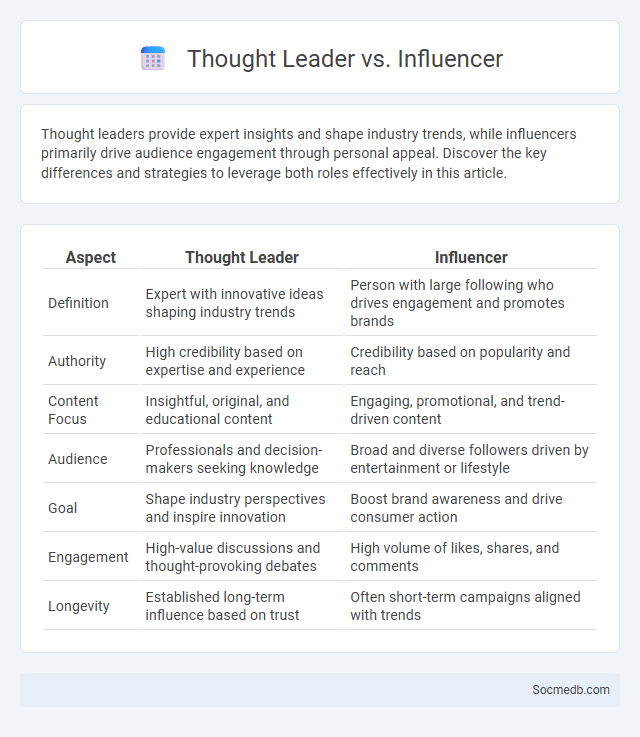
Photo illustration: Thought Leader vs Influencer
Thought leaders provide expert insights and shape industry trends, while influencers primarily drive audience engagement through personal appeal. Discover the key differences and strategies to leverage both roles effectively in this article.
Table of Comparison
| Aspect | Thought Leader | Influencer |
|---|---|---|
| Definition | Expert with innovative ideas shaping industry trends | Person with large following who drives engagement and promotes brands |
| Authority | High credibility based on expertise and experience | Credibility based on popularity and reach |
| Content Focus | Insightful, original, and educational content | Engaging, promotional, and trend-driven content |
| Audience | Professionals and decision-makers seeking knowledge | Broad and diverse followers driven by entertainment or lifestyle |
| Goal | Shape industry perspectives and inspire innovation | Boost brand awareness and drive consumer action |
| Engagement | High-value discussions and thought-provoking debates | High volume of likes, shares, and comments |
| Longevity | Established long-term influence based on trust | Often short-term campaigns aligned with trends |
Defining Thought Leader: Meaning and Key Traits
A thought leader is an individual or organization recognized for their expertise, innovative ideas, and influence within a specific industry or niche. Key traits include deep knowledge, authoritative communication, and the ability to inspire and shape opinions across social media platforms. Thought leaders consistently produce valuable content that drives engagement and fosters trust among their audience.
What is an Influencer? Scope and Impact
An influencer is a social media content creator who leverages their audience's trust to promote products, services, or ideas, often specializing in niches like fashion, technology, or fitness. The scope of influencers spans platforms such as Instagram, YouTube, TikTok, and Twitter, where their reach can range from thousands to millions, directly affecting consumer behavior and brand perception. Your engagement with influencer content can guide purchasing decisions and shape cultural trends, highlighting the significant impact they have on marketing strategies and digital communication.
Understanding Thought Leadership: Concept and Importance
Thought leadership involves establishing Yourself or Your brand as an authority in a specific industry by consistently sharing expert insights and innovative ideas on social media platforms. This strategic approach enhances credibility, engages target audiences, and drives meaningful conversations that influence market trends. Recognizing the importance of thought leadership helps Your content resonate more deeply and positions You as a trusted voice amid digital information overload.
Thought Leader vs Influencer: Core Differences
Thought leaders establish authority through expertise and original insights, shaping industry trends and guiding professional discourse. Influencers primarily leverage social media presence and follower engagement to promote brands and lifestyle choices, often prioritizing audience size over deep subject matter knowledge. The core difference lies in thought leaders driving innovation and informed dialogue, whereas influencers excel in marketing and audience-driven content dissemination.
The Role of Authority in Thought Leadership
Authority in thought leadership on social media significantly impacts audience trust and engagement, positioning leaders as credible sources within their industry. High-authority accounts, characterized by verified credentials, consistent expert content, and substantial follower trust, drive meaningful conversations and influence decision-making processes. Leveraging authority metrics such as follower quality, content relevance, and interaction rates enhances visibility and solidifies thought leadership reputation across digital platforms.
Influence vs Insight: Value Creation Compared
Influence metrics on social media quantify your reach and engagement, highlighting follower count and interaction rates. Insight, however, delves into audience behavior and sentiment analysis, offering deeper understanding for targeted content creation. Prioritizing insight over influence fosters genuine value creation by aligning content with your audience's needs and preferences.
Building a Personal Brand: Leader or Influencer?
Building a personal brand on social media requires strategically positioning yourself as either a leader with authoritative expertise or an influencer who engages and inspires a loyal audience. Your content should consistently reflect your unique voice and values, establishing trust and credibility within your niche. Effective personal branding amplifies Your reach, transforming followers into a community that supports your long-term goals.
Content Strategies: Thought Leadership vs Influence Marketing
Effective social media content strategies pivot on Thought Leadership and Influence Marketing, each serving distinct purposes. Thought Leadership establishes Your authority by sharing expert insights and original ideas that build trust and credibility with a targeted audience. Influence Marketing leverages popular personalities to boost brand visibility and engagement through authentic endorsements, maximizing reach and conversion potential.
Measuring Success: Metrics for Leaders and Influencers
Leaders and influencers gauge social media success through metrics like engagement rate, follower growth, and content reach. Tracking click-through rates and conversion rates provides insight into audience behavior and campaign effectiveness. Sentiment analysis and audience demographics further refine strategies to enhance brand presence and influence.
Which Path to Choose: Becoming a Thought Leader or Influencer
Choosing between becoming a thought leader or an influencer on social media depends on your goals and audience engagement style. Thought leaders build credibility through expertise and valuable insights within a niche, attracting followers who seek knowledge and trust their opinions. You should focus on sharing well-researched content and fostering meaningful discussions to establish authority, whereas influencers prioritize personal branding and lifestyle content aimed at driving trends and high follower interaction.
 socmedb.com
socmedb.com